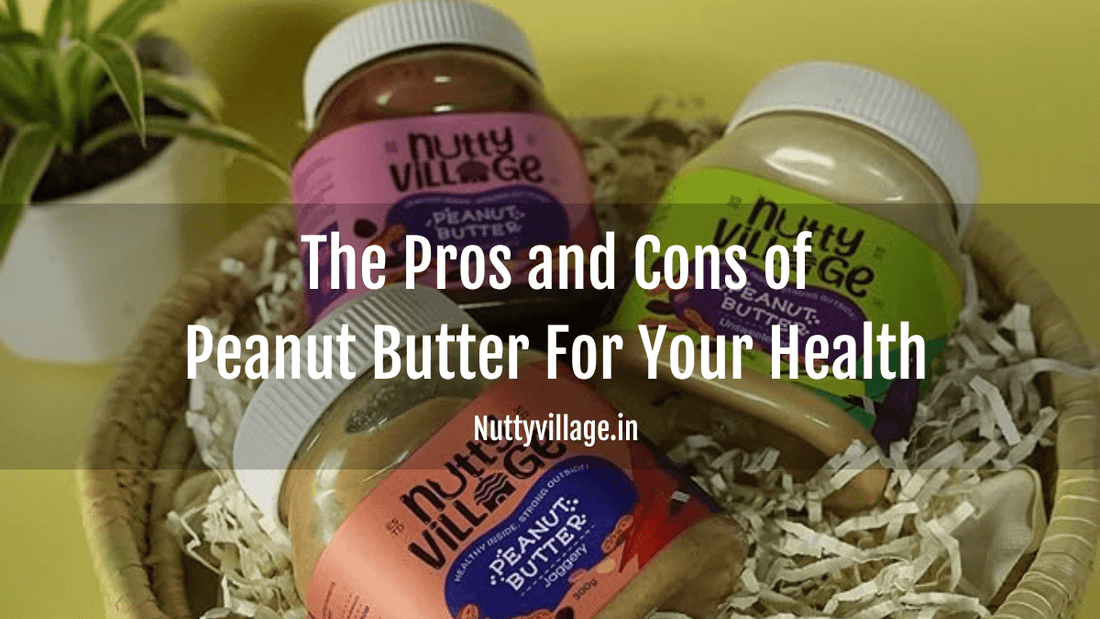
The Pros and Cons of Peanut Butter For Your Health
Umesh Singh RawatShare
Peanut butter, a beloved spread enjoyed by people of all ages, has long been a staple in many households. Its creamy texture and rich flavor make it a popular choice for sandwiches, snacks, and even as an ingredient in various recipes. However, when it comes to its impact on health, opinions are divided. Some tout peanut butter as a nutritional powerhouse, while others raise concerns about its high calorie and fat content. In this blog post, we'll delve into the pros and cons of peanut butter to help you make an informed decision about whether to include it in your diet.
The Pros of Peanut Butter
Let's begin by exploring the numerous benefits that peanut butter offers.
Protein-Packed Goodness
One of the most significant advantages of peanut butter is its impressive protein content. A mere two-tablespoon serving provides around 8 grams of protein, making it an excellent choice for individuals looking to increase their protein intake, especially vegetarians and vegans. Protein is essential for building and repairing tissues, maintaining muscle mass, and keeping you feeling full and satisfied.
Heart-Healthy Fats
Contrary to popular belief, not all fats are created equal. Peanut butter primarily contains monounsaturated and polyunsaturated fats, which are considered beneficial for heart health. These healthy fats can help lower LDL (bad) cholesterol levels and reduce the risk of heart disease when consumed as part of a balanced diet. In fact, studies have shown that regular consumption of nuts, including peanuts, may lower the risk of cardiovascular disease.
Nutrient-Dense Powerhouse
Peanut butter is not only delicious but also packed with a wide array of essential vitamins and minerals. It is an excellent source of vitamin E, a powerful antioxidant that helps protect cells from damage caused by free radicals. Additionally, peanut butter provides a significant amount of magnesium, which is crucial for bone health, muscle and nerve function, and energy production. Other notable nutrients found in peanut butter include potassium, zinc, and B vitamins, all of which contribute to overall health and well-being.
Versatile and Convenient
One of the reasons peanut butter is so popular is its versatility. It can be spread on bread, crackers, or fruits, used as a dip for vegetables, or incorporated into smoothies and baked goods. Its creamy texture and rich flavor make it a satisfying addition to various dishes. Moreover, peanut butter is a convenient food item that doesn't require any preparation. It can be easily stored in the pantry or carried on-the-go, making it a handy snack option for busy individuals.
The Cons of Peanut Butter
While peanut butter boasts numerous benefits, it's essential to be aware of its potential drawbacks.
Calorie Dense
One of the primary concerns surrounding peanut butter is its high calorie content. A two-tablespoon serving contains around 190 calories, which can quickly add up if consumed in large quantities or too frequently. For individuals trying to manage their weight or maintain a calorie deficit, the calorie density of peanut butter can be a challenge. It's crucial to practice portion control and be mindful of the amount consumed to avoid overindulging.
Unhealthy Additives in Some Brands
Not all peanut butter is created equal. Many commercial brands often contain added sugars, hydrogenated oils, and preservatives to enhance flavor and extend shelf life. These additives can negate the potential health benefits of peanut butter and contribute to various health concerns. Added sugars can lead to weight gain, increased inflammation, and a higher risk of chronic diseases such as diabetes and heart disease. Hydrogenated oils, also known as trans fats, have been linked to an increased risk of heart disease and should be avoided.

Allergenic Properties
Peanuts are one of the most common food allergens, and for individuals with a peanut allergy, consuming peanut butter can trigger severe and potentially life-threatening reactions. Symptoms of a peanut allergy can range from mild (hives, itching, stomach discomfort) to severe (difficulty breathing, swelling of the throat, anaphylaxis). If you have a known peanut allergy or suspect you may be allergic, it is crucial to avoid peanut butter and any products containing peanuts entirely.
Potential for Mold Contamination
Peanuts, like many crops, are susceptible to mold growth, particularly a type of mold called Aspergillus flavus. This mold produces a toxin known as aflatoxin, which has been linked to an increased risk of liver cancer in individuals with chronic hepatitis B. While the presence of aflatoxin in peanut butter is regulated and monitored by government agencies, it is still a concern for some consumers. To minimize the risk, it's essential to purchase peanut butter from reputable brands that adhere to strict quality control measures.
Choosing the Right Peanut Butter
To maximize the pros and minimize the cons of peanut butter, it's crucial to select the right type.
Opt for Natural Peanut Butter
When shopping for peanut butter, look for natural varieties that contain only peanuts and possibly salt. These products are minimally processed and free from added sugars, hydrogenated oils, and artificial additives. Natural peanut butter may have a layer of oil on top, which is normal and can be easily stirred back into the butter. By choosing natural peanut butter, you can reap the nutritional benefits without the added drawbacks of processed varieties.
Practice Portion Control
To avoid overconsuming calories, it's important to be mindful of portion sizes. Stick to the recommended serving size of two tablespoons and use measuring tools to ensure accuracy. Incorporating peanut butter into a balanced diet that includes a variety of nutrient-dense foods can help you enjoy its benefits without overindulging.
Consider Alternative Nut Butters
If you have a peanut allergy or simply want to explore other options, there are several alternative nut butters available. Almond butter, cashew butter, and sunflower seed butter are popular choices that offer similar nutritional profiles to peanut butter. Each has its own unique flavor and texture, allowing you to find the option that best suits your taste preferences and dietary needs.
Conclusion
In conclusion, peanut butter can be a nutritious and delicious addition to your diet when consumed in moderation and chosen wisely. Its protein content, heart-healthy fats, and rich nutrient profile make it a valuable food for supporting overall health. However, it's essential to be mindful of portion sizes, choose natural varieties free from unhealthy additives, and consider individual allergies or sensitivities. By weighing the pros and cons of peanut butter and making informed choices, you can enjoy this beloved spread as part of a balanced and healthy lifestyle.
FAQs:
What should I look for when buying healthy peanut butter?
When purchasing peanut butter, prioritize natural varieties that contain only peanuts and possibly salt. Avoid brands with added sugars, hydrogenated oils, or artificial additives. Read the ingredient list carefully and opt for products with minimal processing to ensure you're getting the most nutritional value.
How do I pick the best peanut butter?
To choose the best peanut butter, consider your personal preferences and dietary needs. If you prefer a creamy texture, opt for smooth peanut butter, while chunky varieties offer a more substantial bite. Look for brands that use high-quality peanuts and have minimal added ingredients. If you're watching your sodium intake, choose unsalted options. Additionally, consider organic peanut butter if you prioritize organic farming practices.
What are the 3 types of peanut butter?
The three main types of peanut butter are creamy, crunchy, and natural. Creamy peanut butter has a smooth and spreadable consistency, while crunchy peanut butter contains visible peanut pieces for added texture. Natural peanut butter, often labeled as "old-fashioned" or "unsweetened," contains only peanuts and possibly salt, without any added sugars or oils.
Can I eat peanut butter every day?
Eating peanut butter every day can be part of a healthy diet when consumed in moderation. The key is to stick to the recommended serving size of two tablespoons and be mindful of the calorie and fat content. Incorporating peanut butter into a balanced diet that includes a variety of nutrient-dense foods can provide numerous health benefits. However, if you have a peanut allergy or are trying to lose weight, you may need to limit your intake or find alternative spreads.
Is peanut butter 100% healthy?
While peanut butter offers several health benefits, it is not 100% healthy in all contexts. The nutritional value of peanut butter depends on the specific brand and ingredients used. Some commercial peanut butter brands contain added sugars, hydrogenated oils, and preservatives that can negate the potential health benefits. Additionally, peanut butter is high in calories and fat, which can contribute to weight gain if consumed in excess. Moderation and choosing natural, minimally processed varieties are key to incorporating peanut butter into a healthy diet.







